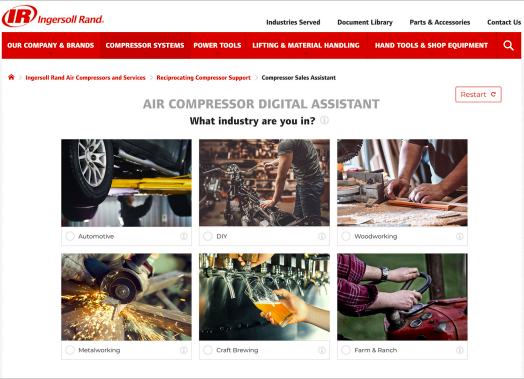Today’s B2B buyers expect and require the same customer-centric digital commerce experiences as they encounter in their consumer lives. Nearly 90% of industrial good buyers use the internet to search, qualify, evaluate, and select suppliers. The ease of navigating the purchasing process has a tremendous impact on the B2B buyer’s opinion, and ultimately, their decision to select a particular supplier. When 84% of buyers say the experience a company provides during their B2B buying process is as important as its product and services, B2B manufacturers need to cater to the digital buyer with self-service experiences centered around education, guidance, and understanding buyer needs.
According to Gartner’s “The New B2B Buying Journey”,
customers who perceive the information they received from suppliers to be helpful in advancing across their buying process were 2.8 times more likely to experience a high degree of purchase, and three times more likely to spend more.
In simpler terms, this means the B2B buyer favors suppliers who prioritize simplifying complex purchase decisions by providing relevant and tailored information aimed to make the buying process more effective and efficient for both parties. Over 60% of B2B buyers want vendors and suppliers to provide them with an “enhanced search experience,” and 71% will seek out a competitor if finding a product or solution is anything less than convenient.
How can B2B manufacturers balance educating and guiding their buyers through their complex buying process? By adopting digital commerce solutions designed for self-service behavior without sacrificing the nuances of complex products and the knowledge B2B buyers expect from their suppliers.
4 ways for B2B Manufacturers to cater to the digital buyer in 2023 and beyond
Provide a customer experience based on needs, not product details
Selling complex products does not mean the buying process should be complicated and full of technical jargon. Traditional search experiences require the customer to search for products based on filters and keywords that assume the user has the time and patience to sift through dozens of results to find what they are looking for. If a sales representative engaged with a buyer like that, it would be a quick way to lose a sale: B2B manufacturers need to transform technical specs into needs-based terms. By doing so, the buyer receives a more personalized experience based on what they’re looking for and how it solves a greater need, instead of trying to navigate overwhelming amounts of intricate product detail.
Simplify the decision-making process with education and guidance
On average B2B buyers will complete 60-80% of their buying journey before speaking to a person, they are accustomed to conducting their own research to purchase products and services online from their consumer lives. They still require education and guidance to be ready to speak to a sales rep or purchase online even though they are comfortable doing their own research. Adapting a guided experience that helps narrow down search results into a relevant, manageable set with education helps buyers feel supported through their journey, and showcases how much the supplier values being a helpful and informative resource. Manufacturers like Schneider Electric and Ingersoll Rand leverage product discovery to guide their buyers through complex purchasing decisions based on needs. Try out Ingersoll Rand’s Air Compressor Advisor to see the most effective search experience available for B2B manufacturers.

Make tailored recommendations for increased buyer confidence
B2B manufacturers need to provide tailored product and service recommendations based on needs and wants, not on what may be the top-selling product range. Narrowing down choices requires understanding each individual buyer’s unique needs and wants to identify what options are best suited to them. If you consider the traditional digital buying experience, it is nearly impossible to know if a product is the right fit for your needs. Purchasing the wrong product could mean delays in critical business activities, wasted materials, or even harm to colleagues. B2B buyers need to be incredibly confident they have identified the exact product they need. That’s why 3M’s Safety Solutions Division implemented a guided selling experience that recommends the correct protective gear based on buyer needs, compliance, and usage. Try out 3M’s Eyewear Safety Advisor below to see the experience for yourself.
Maintain a consistent search experience across all distribution channels
While data suggests B2B buyers are frequently going directly to manufacturers to fulfill purchasing orders, marketplaces and distributors remain important channels to the B2B sector. Having a consistent buying journey on all channels signals to buyers that a manufacturer prioritizes making the path to purchase more effective and personal no matter where they decide to make their order from. As mentioned earlier, B2B buyers spend a significant amount of time conducting research ahead of purchasing: be the supplier who caters to their needs and shortens their path to purchase wherever they evaluate their decisions.
Brand manufacturers who tackle the challenges of digital commerce with simplified search experiences will be able to adapt to changes in the market and economy much faster than those who fall behind in their digital transformation. To learn more about how B2B manufacturers can meet changing buyer expectations, download our white paper on “AI Conversational Search is rewriting the future of manufacturing.”

